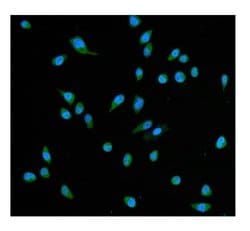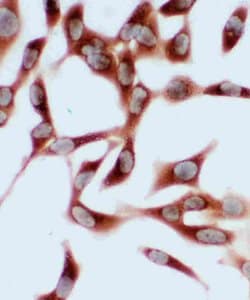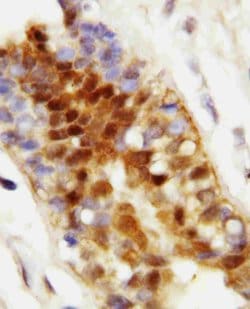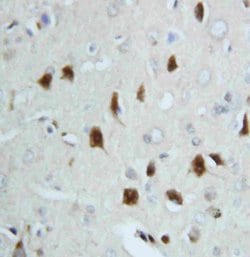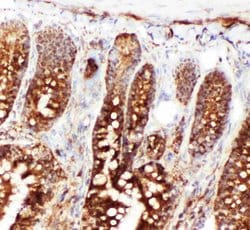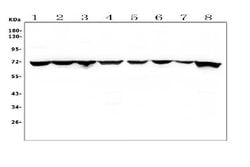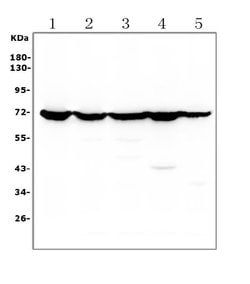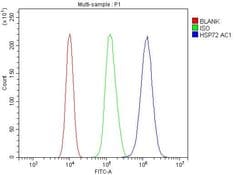Learn More
Invitrogen™ HSC70 Polyclonal Antibody
Rabbit Polyclonal Antibody
Supplier: Invitrogen™ PA594951
Description
Reconstitute with 0.2 mL of distilled water to yield a concentration of 500 μg/mL. Positive Control - WB: human HEK293 whole cell, human Caco-2 whole cell, human PC-3 whole cell, human THP-1 whole cell, human U2OS whole cell, rat brain tissue, rat liver tissue, rat spleen tissue, rat PC-12 whole cell, mouse brain tissue, mouse liver tissue, mouse spleen tissue, mouse RAW2467 whole cell. IHC: rat brain tissue, mammary cancer tissue IHC-F: rat intestine tissue. ICC/IF: Hela cell. Flow: 293T cell. Store at -20°C for one year from date of receipt. After reconstitution, at 4°C for one month. It can also be aliquotted and stored frozen at -20°C for six months. Avoid repeated freeze-thaw cycles.
The HSP70 family is a set of highly conserved proteins that are induced by a variety of biological stresses, including heat stress, in every organism in which the proteins have been examined. The human HSP70 family members include: HSP70, a protein which is strongly inducible in all organisms but which is also constitutively expressed in primate cells; HSP72, a 72 kDa protein that is induced exclusively under stress conditions; HSC70, or cognate protein, is a 72 kDa, constitutively expressed, protein which is involved in the uncoating of clathrin coated vesicles; GRP78, or BiP, is a glucose regulated 78 kDa protein localized in the endoplasmic reticulum; and p75, or HSP75, a 75 kDa protein that is found within the mitochondria. HSC70 (also known as HSC71, HSC73, HSP73, p72, prp73) is expressed constitutively and is slightly heat-inducible. HSC70 binds to the exposed loop of clathrin light chains to promote uncoating and can also bind the cytoskeleton which may facilitate cytoskeletal rearrangements. HSC70 has been shown to stimulate lysosomal degradation of intracellular proteins and to retard both aggregation and folding of mitochondrial precursor proteins in vitro.
Specifications
| HSC70 | |
| Polyclonal | |
| Unconjugated | |
| Hspa8 | |
| 2410008N15Rik; AAG2; constitutive heat shock protein 70; constitutively expressed heat shock protein; epididymis luminal protein 33; epididymis secretory sperm binding protein Li 72p; FAM10A1; Heat shock 70 kDa protein 8; heat shock 70kd protein 10; heat shock 70kd protein 10 (HSC71); heat shock 70kD protein 8; heat shock 70kDa protein 8; heat shock cognate; heat shock cognate 70; heat shock cognate 71 kD protein; heat shock cognate 71 kDa protein; heat shock cognate 71 kDa protein-like protein; heat shock cognate 71-kd protein; heat shock cognate hsc73; heat shock cognate protein 54; Heat shock cognate protein 70; heat shock protein 70 cognate; heat shock protein 8; heat shock protein A8; heat shock protein cognate 70; heat shock protein family A (Hsp70) member 8; HEL-33; HEL-S-72p; HIP; HSC54; Hsc70; Hsc70 ATPase; HSC70 protein; Hsc71; Hsc73; HSP70; HSP71; HSP73; Hspa10; Hspa8; hspa8 protein; I79_022974; LAP; LAP1; LAP-1; lipopolysaccharide-associated protein 1; LPS-associated protein 1; MGC131511; MGC29929; NIP71; N-myristoyltransferase inhibitor protein 71; Protein FAM10A1; similar to 7O KDa heat shock cognate protein; SNC6; unnamed protein product; wu:fb01g06; wu:fi48b06 | |
| Rabbit | |
| Affinity chromatography | |
| RUO | |
| 15481, 24468, 3312 | |
| -20°C | |
| Lyophilized |
| Flow Cytometry, Immunohistochemistry (Frozen), Immunohistochemistry (Paraffin), Western Blot, Immunocytochemistry | |
| 500 μg/mL | |
| PBS with 5mg BSA and 0.05mg sodium azide, 0.05mg thimerosal | |
| P11142, P63017, P63018 | |
| Hspa8 | |
| A synthetic peptide corresponding to a sequence at the N-terminus of human Hsp70 (13-31aa TTYSCVGVFQHGKVEIIAN). | |
| 100 μg | |
| Primary | |
| Human, Mouse, Rat | |
| Antibody | |
| IgG |
Your input is important to us. Please complete this form to provide feedback related to the content on this product.
